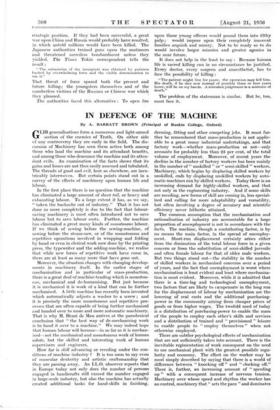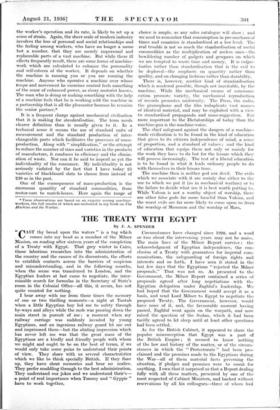IN DEFENCE OF THE MACHINE
By A. BARRATT BROWN (Principal of Ruskin College, Oxford)
In the first place there is no question that the machine has eliminated a large amount of sheer toil, or heavy and exhausting labour. To a large extent it has, as we say, " taken the backache out of industry." That it has not done so more completely is due to the fact that labour- saving machinery is most often introduced not to save labour but to save labour costs. Further, the machine has eliminated a great many kinds of monotonous labour. If we think of sewing before the sewing-machine, of sawing before the steam-saw, or of the monotonous and repetitive operations involved in wrapping and folding by hand or even in clerical work now done by the printing press, the typewriter and the adding-machine, we realise that while new forms of repetitive work have come in, there are at least as many more that have gone out.
Moreover, the situation changes with changing develop- ments in machinery itself. In the earlier stages of mechanisation and in particular of mass-production, there is a great deal of machine-tending which is monoton- ous, mechanical and de-humanising. But just because it is mechanical it is work of a kind that can be further mechanised. A little machine has recently been invented which automatically adjusts a washer to a screw ; and it is precisely the more monotonous and repetitive pro- cesses that are often capable of being further mechanised and handed over to more and more automatic machinery. That is why M. Henri de Man arrives at the paradoxical conclusion that " the best way of de-mechanising work is to hand it over to a Machine." We may indeed hope that human labour will become—in so far as it is mechan- ised—not the mechanical and monotonous work of human robots, but the skilled and interesting work of human supervisors and engineers.
How far is skill advancing or receding under the con- ditions of machine industry ? It is too soon to say even of muscular dexterity and artistic craftsmanship that they are passing away. An I.L.O. observer reports that in Europe today not only does the number of persons engaged in handicrafts still exceed the number engaged in large-scale industry, but also the machine has actually created additional tasks for hand-skills in finishing, dressing, fitting and other competing jobs. It must fur- ther be remembered that mass-production is not applic- able to a great many industrial undertakings, and that factory work—whether mass-production or not—only accounts for probably less than 25 per cent. of the total volume of employment. Moreover, of recent years the decline in the number of factory workers has been mainly in the number of unskilled " or " semi-skilled " workers. Machinery, which begins by displacing skilled workers by Unskilled, ends by displacing unskilled workers by auto- matic machines run by skilled workers. Today there is an increasing demand for highly-skilled workers, and that not only in the engineering industry. And if some skills are receding, new forms of skill are coming in, less special- ised and calling for more adaptability and versatility, but often involving a degree of accuracy and scientific efficiency never hitherto attained.
The common assumption that the mechanisation and rationalisation of industry are accountable for a large proportion of unemployment is not in accordance with the facts. The machine, though a contributing factor, is by no means the main factor, in the spread of unemploy- ment. Short-run displacement certainly arises either from the diminution of the total labour force in a given concern or from the substitution of semi-skilled juvenile and often female labour for that of older male- workers. But two things stand out—the stability in the number of skilled workers in mechanised concerns over a period of years, and the fact that unemployment is worst where mechanisation is least evident and least where mechanisa- tion is most evident. Moreover, while it is admitted that there is a time-lag and technological unemployment, two factors that are likely to compensate in the long run for the displacement of labour by mechanisation are the lowering of real costs and the additional purchasing- power in the community arising from cheaper prices of goods or from higher wages. The twofold need of today is a distribution of purchasing-power to enable the mass of the people to employ each other's skills and services and a distribution of trained and " provisioned " leisure to enable people to " employ themselves " when not otherwise employed..
There are subtler psychological effects of mechanisation that are not sufficiently taken into account. There is the inevitable regimentation of work consequent on the need to use mechanical plant with the greatest .possibilc regu- larity and economy. The effect on the worker may be most simply described by saying that there is a world of difference between " knocking off " and " clocking off." There is, further, an increasing amount of " speeding up " with a consequent increase of nervous tension. Machinery over whose speed and rhythm the worker has no control, machinery that " sets the pace " and dominates the worker's operation and its rate, is likely to set up a sense of strain. Again, the sheer scale of moderii industry involves the loss of personal and social relationships and the feeling among workers, who have no longer a name but a number, that they are merely impersonal and replaceable parts of a vast machine. But while these ill effects frequently result, there are some formi of machine- work which are calculated to enhance the personality and self-esteem of the worker. It depends on whether the machine is running you or you are running the machine. Anyone who operates a machine over whose tempo and movement he exercises control feels something of the sense of enhanced power, as every motorist knows. The man who is doing or making•something with the help of a machine feels that he is working with the machine in a partnership that is all the pleasanter because he remains the senior partner.* It is a frequent charge against mechanical civilisation that it is making for standardisation. The term needs clearer definition than is usually given -to it. In a technical sense it means the use of standard units of measurement and the standard production of inter- changeable parts which facilitates the processes of mass- production. Along with " simplification," or the attempt ,to reduce the number of sizes and varieties in the products of manufacture, it conduces to efficiency and the elimin- ation of waste. Nor can it be said to imperil as yet the individuality of the consumer. My individuality is not seriously violated by the fact that I have today 25 varieties of blackboard slate to choose from instead of 250 as in the past.
One of the consequences of mass-production is the enormous quantity of standard commodities, from motor-cars to match-boxes. Here again the range of * These observations are based on an enquiry among machine. workers, the full results of which are embodied in my book on The Machine and the Worker. choice is ample, as any sales catalogue will show ; and we need to remember that consumption in pre-mechanical times and countries is standardised at a low level. The real trouble is not so much the standardisation of useful commodities as the multiplication of useless ones-the bewildering number of gadgets and gewgaws on which we are tempted to waste time and money. It is vulgar- isation rather than standardisation that is the evil to be deplored—the emphasis on quantity rather than quality, and on changing fashions rather than durability.
There is, however, another kind of standardisation which is rendered possible, though not inevitable, by the machine. While the mechanical means of communi- cation promote variety, the mechanical reproduction of records promotes uniformity. The Press, the radio, the gramophone and the film reduplicate vast masses of identical material, and may be exploited with a view • to standardised propaganda and mass-suggestion. Far more important to the Dictatorships of today than the machine-gun is the machine-voice.
The chief safeguard against the dangers of a machine- made civilisation is to be found in the kind of education that gives to its citizens independence of mind, a sense of proportion, and a standard of values ; and the kind of education that equips them not only or mainly for the work they have to do but for the leisure which they will possess increasingly. The test of a liberal education is to be found in what it leads ordinary people to do with themselves in their leisure time.
The machine then is neither god nor devil. The evils which we associate with it are mainly due either to the use to which we put it (as in mechanical warfare) or to the failure to decide what use it is best worth putting to. While Vulcan is not a worthy object of worship, there are other false gods far more baneful than Vulcan, and the worst evils are far more likely to come upon us from the worship of Mammon and the worship of Mars.







































 Previous page
Previous page